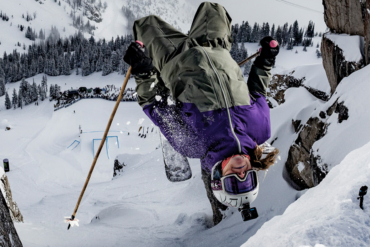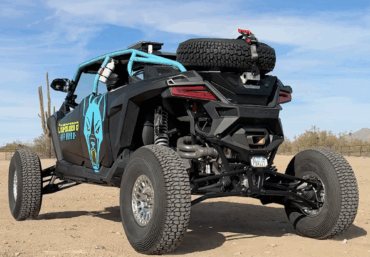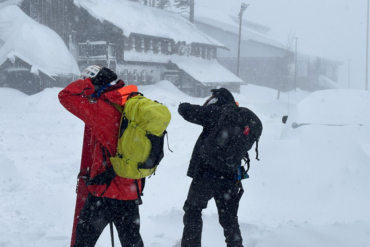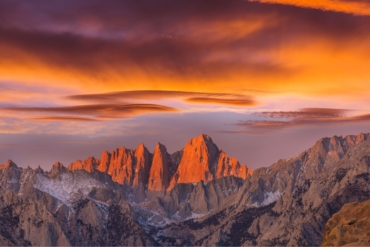Curt Hamby knew right away that he wasn’t suited for an office job.
Curt Hamby’s first (and only) desk-jockey gig was working as the international logistics coordinator for Pearl Izumi, the cycling garment powerhouse out of Boulder, Colorado. His office had a door that opened out to the Flat Irons.
For most of us, that would be a pretty choice corner office. For Hamby’s feral disposition? “I knew I had to get out of there!”
Hamby has always been drawn toward working outside. One part luck, two parts passion, and some 30 years after leaving Pearl Izumi, Hamby has built his own nontraditional 9-to-5 by following his heart and being stubborn about it.
These days, Hamby splits his season between working on Jackson Hole’s Ski Patrol in winter and guiding fishing trips across the Western Hemisphere in summer.
Want to make it in Hamby’s boardroom? Candidates looking for the status quo need not apply. To hack it the Hamby way, be prepared to bring a respectable amount of resourcefulness.
Being an outdoor professional would be a dream job for many of us. But it doesn’t come easy. Follow along as we go directly to the source and learn from pros like Curt Hamby about their success, careers, families, and passion projects “In Real Life.”

Resourceful Beginnings
If you listen closely, you can catch Hamby’s faint Texan drawl. It’s tempered from years spent in Jackson Hole. His thick, silver beard muffles what’s left of it. Growing up outside of Dallas, Hamby fished, hunted, and, of course, played high school football.
“I lived the Friday night lights,” he jokes.
But the mountains are a far cry from the grain towers that rocked Hamby’s rural skyline outside Dallas-Fort Worth. Like many of us, his first introduction to the mountains was through his family.
“Ski vacations with the family, church trips in summer — the mountains got in my head and never left,” he said. And while many of us would have been stoked for the steady salary of an outdoor industry job like Pearl Izumi, Hamby still yearned for something more … him.
When he applied to Copper Mountain’s patrol, he averaged maybe 10-20 days a year on his skis — meager by any mountain town standards. His chances of getting hired on were slim. But youthful exuberance and a stubborn disposition make a strong cocktail.
So Hamby did what any cowboy would do. He didn’t focus on his lack of experience; instead, he rode hard what he could bring to the job. He may not have grown up skiing, but Hamby knew how to drive heavy equipment. And that just happened to be what Copper Mountain was searching for that year — a snowcat operator to shuttle patrollers up the mountain to clear the slopes of heavy snow.
For Hamby, it was a foot in the door. He leveraged that opportunity and worked it for 5 years, developing a level of comfort with explosives, first-aid skills, and rescue techniques. And while he could have stayed at Copper Mountain, the crux of any winter work is, well, summer.
Baited & Hooked
If you want to live the ski patroller’s lifestyle, your year revolves around winter. To bridge the season, patrollers roll up their sleeves and patch a summer salary in any way they can. Many take up odd jobs washing windows, painting houses, or construction. Hamby? He took up landscaping. But being an avid kayaker, he’d spend all his extra time on the water.
Maybe it was luck or maybe it was timing. But when an outfitter came looking for someone who knew how to fly fish to guide a few clients, Hamby raised his hand.
He had a boat and knew the basics, but notes he didn’t know which flies to use: “The guy handed me a wad of flies and told me to just tie one on. If it works, keep using it. If it doesn’t, change it.”
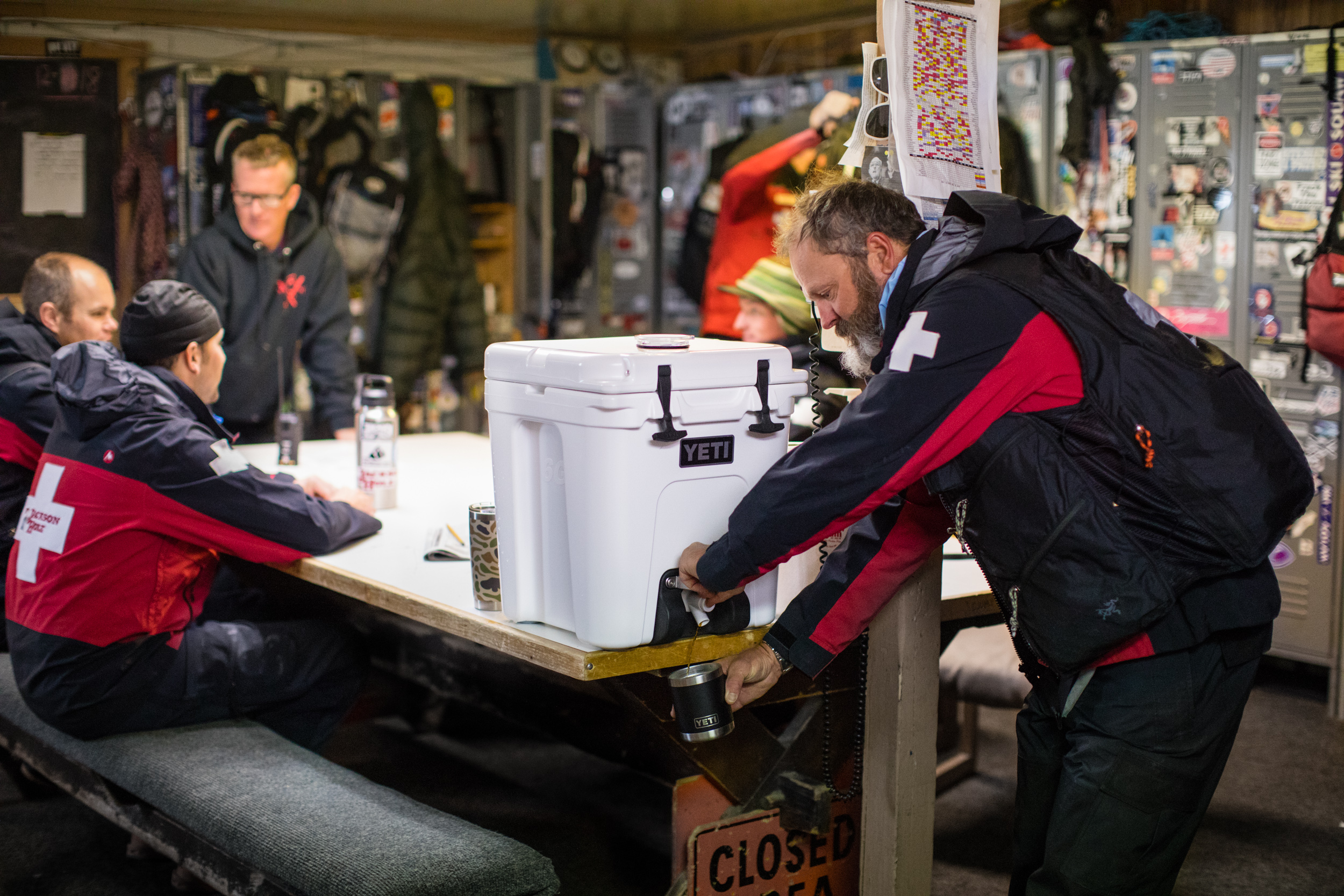
Hamby had a great day on the river. The clients were friendly, and the conversation was great. He even netted a few fish. “At the end of the day, they gave me a big fat tip and I said to myself, ‘I’m going to do this for a living!'” he told us.
It all snapped into focus then. He was going to spend the rest of his life patrolling in winter and guiding in summer. Living in Colorado, you’d think he was set. But like any do-it-yourself career, going your own way — well, it’s just not that easy.
The final piece of the puzzle? He needed to find a place where he could both ski and guide clients by raft. And in Colorado, he was stuck on shore, wading in to fish the waters. That brought him to a simple choice: Jackson or Montana.
“I had already skied Jackson,” he admitted. By the following summer, Hamby followed his heart once again and took another risk, this time up and moving to Jackson, Wyoming, to hunt down a job on the Jackson Hole Ski Patrol.
Moonshot
Let’s be clear. For most, this is a moonshot. Jackson Hole Ski Patrol is widely respected as the best of the best. Fifty percent of its terrain is expert, making it one of the hardest mountains in the world to work. The positions are coveted and turnover is low. And then there’s Hamby, “the Texan,” who didn’t come from a big ski background.
But he was stubborn!
It took him three seasons of browbeating the chief and a string of retirements before he was finally hired on. What clinched the deal? His time driving snowcats at Copper Mountain. He may not have known the mountain, but he had a compelling amount of experience managing dangerous snow with explosives.
It was a combination of skills that no other candidate could bring that year. Once just a dream of a carousel’s brass ring, through sticking to his guns, Hamby had finally grasped the life he wanted.
And you can too. Here’s what to expect.
Life of a Jackson Hole Ski Patrol
The life of a Jackson Hole ski patroller is both scheduled and wildly unpredictable.
To keep the skills sharp — and the general public’s experience seamless — the Jackson Hole team is steeped in regular training. The policies are nationwide and consistent between resorts. Each season kicks off with “hell week,” 4 days of in-class learning.
“It’s the most I’ll ever sit in an office all year,” Hamby joked. The patrol reviews first-aid skills, gets hands-on with splints and bandaging, and gets reacquainted with defibrillators.
The education continues in the field with lift evacuation, rappelling out of chairs, transceiver drills, and running hasty search drills — a big scenario drill that practices rapid response to a potential avalanche incident.
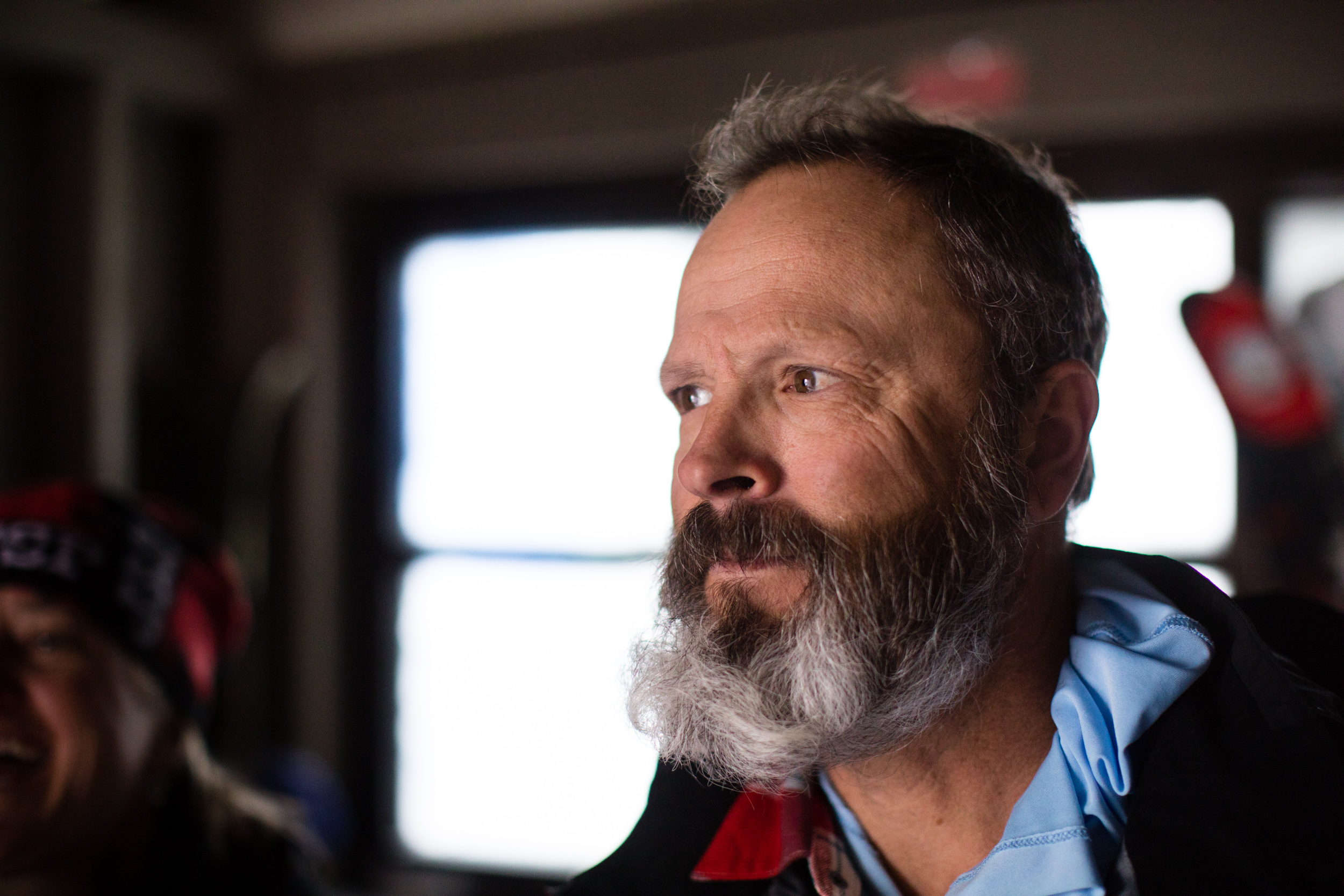
On a normal day, the forecast comes through at 2 p.m. the afternoon before, and the weather data is analyzed and dispatched to patrollers. Hamby explained that at the beginning of the season, everyone is assigned a route. The crew deploys explosives in starting zones, clearing the mountain of heavy loads, and then heads over to their duty station for opening time.
“If it snows enough, we do avalanche mitigation,” Hamby said. “If it doesn’t snow, we have an 8 a.m. team meeting,” where the crew is assigned to one of three stations on the mountain.
Daily duties include first-aid checks, ski run checks, or picking up jobs called in the night before. On the slopes, the crew will manage trail signs, rope lines, or maybe hosting a visiting patroller on a backcountry tour.
The most coveted station? Top of the tram at the Mountain Station, of course! End of your shift, you point the skis downhill toward home.
The Good With the Bad
Running north to south, Jackson Hole’s weather funnels in from the West and Southwest. The conditions can change every day, throughout the day. But the rigorous training prepares them for almost everything.
“When the weather comes in, I already know what I’m going to do. It may change, but I know what to do to mitigate it,” shares Hamby. “People? You don’t know what’s gonna happen.”
The scariest days are those bluebird days. The days after big dumps. And with ski crowds growing inbounds, more and more skiers are flocking into the backcountry in search of that cowboy snow.
“Most of them are prepared,” Hamby said. But it’s not always so.
Hamby recalls getting called out to a rescue on the Jersey Shore, a deceptively tranquil slope that gently rolls out of bounds before it sucks skiers into deep couloirs that cliff out.
“We found this guy clutching to the rock, with his skis literally teetering off the edge of the 200-foot cliff,” he shared. It’s a good reminder to read the signs and give the mountain a healthy serving of respect. Unfortunately, not all situations have good outcomes.
“You can’t always tame the white dragon — we see death every year,” Hamby said soberly. He doesn’t talk about it much, and when he does, he tries to keep it at work. “The camaraderie is so good, you don’t have to bring it home. The other workers help you get through this stuff. Laughing at yourself, but you’re crying too. You don’t last if you internalize it.”
Hamby’s solution? He goes back to what drew him to the sport.
“I let it out on the slopes and put the ski back in the ski patrol.”
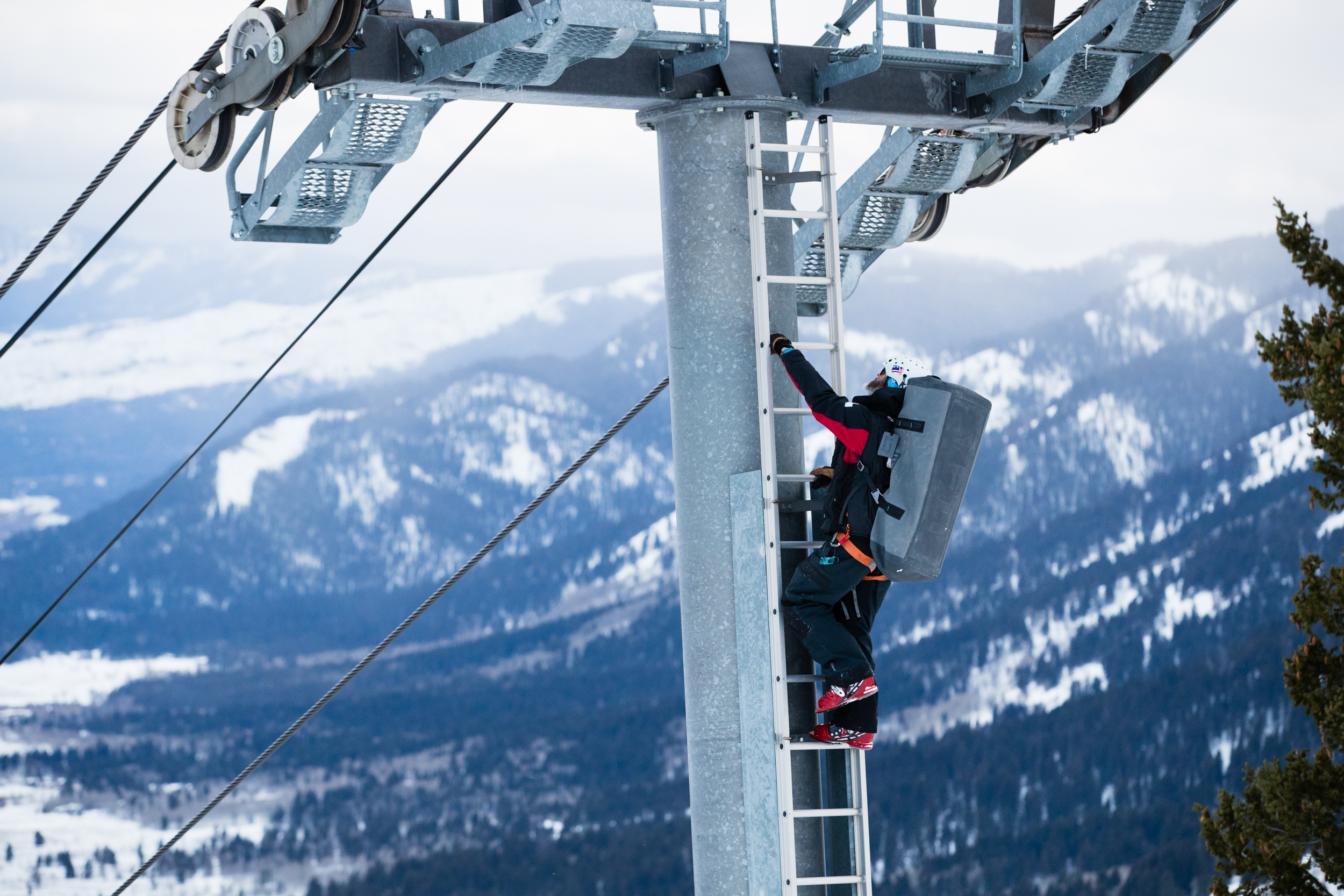
Living the Mountain Town Life
It’s no secret that mountain life is quickly becoming harder to afford. Fortunately, the professional ski bum is a resourceful sort.
“Probably everybody started out living in a dumpy cabin with a bunch of people,” Hamby chuckles.
Jackson Hole pays its patrollers a fair wage. It provides most of the tools for the job, too, outfitting each patroller with airbags, helmets, transceivers, shovels, probes, and a vest to carry it all in.
Outside his skis, Hamby gives props to YETI’s Panga bag, in which the patrol store lift evac equipment. Bonus: This bag works just as well on the river during guiding season. And the YETI Tundra 350 cooler stocks Bernie’s Boom Boom Room, a space once used to assemble explosives but is now the exclusive après-patrol bar.
Of course, skiing is seasonal. While there will always be a crush of patrollers flocking to fishing and rafting during summer, many trade skis for tools of another craft. Patrollers turn to construction, painting, and landscaping during the summer to round out their year.
And with resorts pushing summer activities on the bike, both full-time seasonal (winter) and full-time (both winter and summer) work opportunities are available year-round on the Jackson Hole Mountain patrol. The pay is great, the benefits are full, and you get a nice shoulder season break in May.
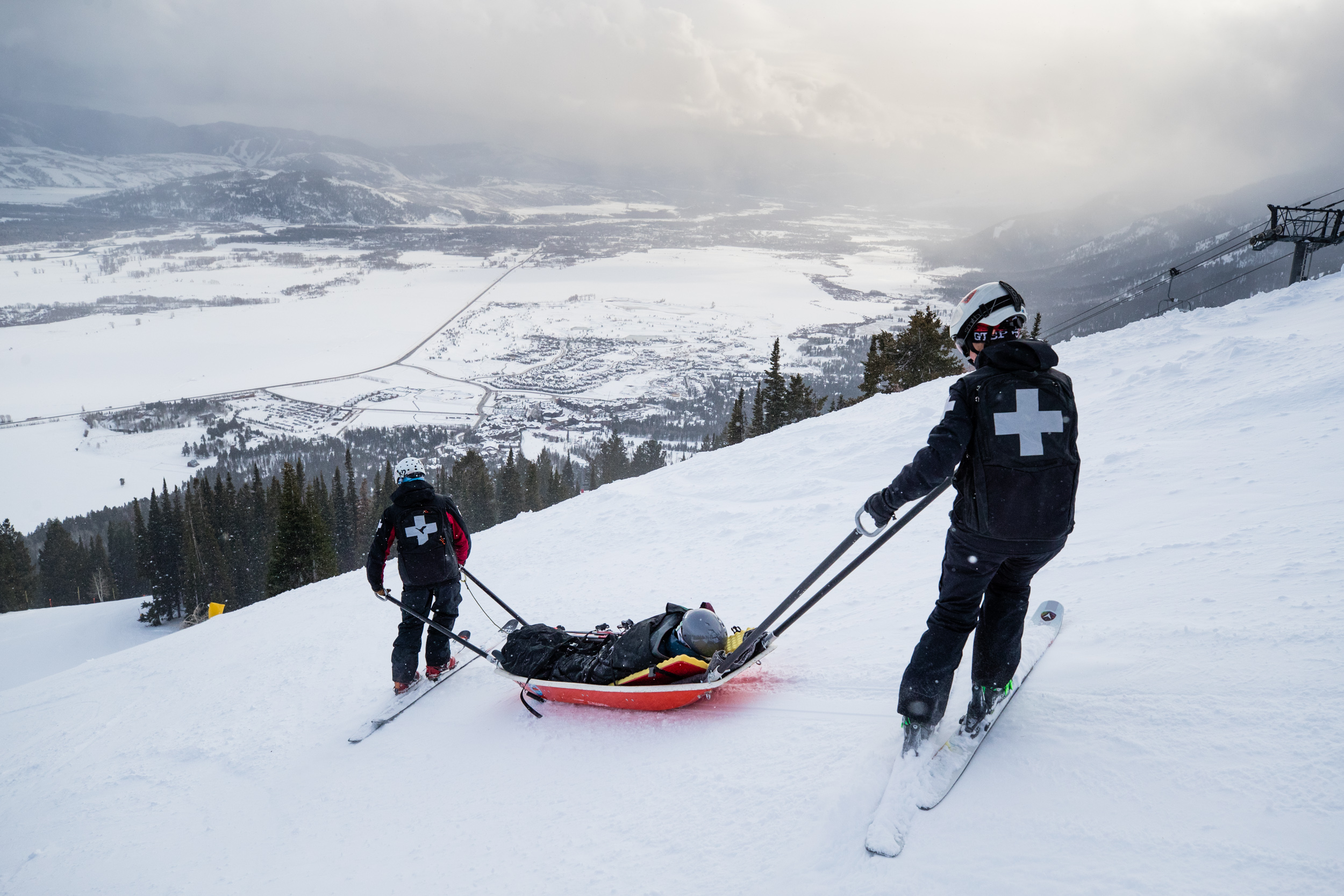
Road to ‘Success’
For those interested in following in Hamby’s tracks, it might not be as hard as you think. Hamby recommends that candidates “show an interest, put your name out there, and get seen.” He’s seen folks work their way up from the lift, tuning skis in town, or even working retail.
“Just take every opportunity to get to know the patrollers,” he advised.
Ski patrol can be a lifelong career (the most recent patroller retired at age 70), but it doesn’t come without its bumps and bruises. Patrolling is physical and “workman’s comp will eventually buy you a new pair of knees,” Hamby shared jokingly. There’s always the opportunity for the seasoned to transition to management.
Hamby’s been presented those opportunities, but he’s chosen to follow the water cycle long ago, from first flake to the tapering runoff. Like most of us, he clocks in and clocks out. With a family, a mortgage, stable employment, and following his passion, Hamby seems to have figured it out.
“I do have the perfect life, still, after 20-25 years.”
Tools of the Trade: YETI Panga Duffel
The demands of the Jackson Hole Ski Patrol Team call for a “gear fortress” that you can count on to keep your gear 100% dry. The Panga Duffel is durable, adjustable, and 100% waterproof, so you’re ready for anything the days on the mountains throw at you.
See the Panga DuffelThis article is sponsored by YETI as part of the brand’s ‘In Real Life’ content series.



